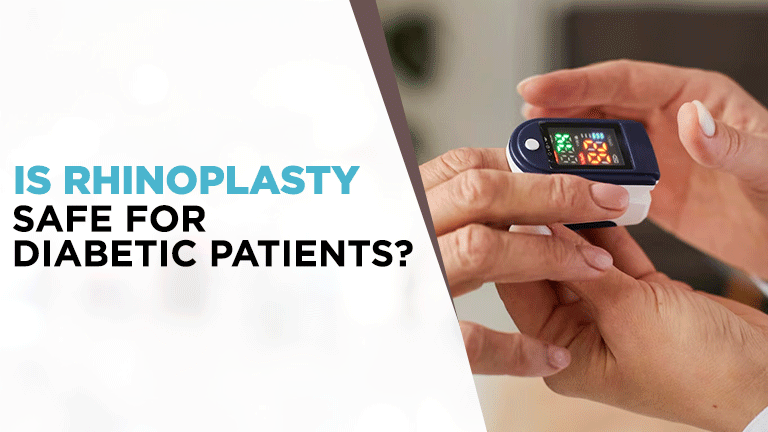
- Home
- About
- Skin Care
Minor Surgical Procedures
Non Surgical Facial Enhancement
- Hair Care
- Bride And Groom
- Plastic Surgery
- Before After
- Testimonial
- Media
- Contact

Rhinoplasty, commonly known as a nose job, continues to be one of the most sought-after cosmetic procedures worldwide. For diabetic individuals intrigued by the possibility of enhancing their facial appearance through rhinoplasty, the question of safety naturally arises.
Is rhinoplasty safe for diabetic patients? The answer is YES, Rhinoplasty is safe for diabetic patients if performed under an experienced plastic surgeon.
However, it’s crucial to go deeper into the nuances to ensure a safe and successful experience. Addressing safety concerns is paramount, especially for diabetic individuals considering surgery, as managing diabetes adds layers of consideration to any medical procedure.
Table of Contents
ToggleDiabetes, a condition characterized by high blood sugar levels, requires careful consideration in surgical settings due to its potential impacts on healing and recovery. For diabetic patients considering rhinoplasty (nose job surgery), it’s crucial to understand how diabetes can affect surgical outcomes. Diabetes can potentially increase the risk of complications such as delayed wound healing, infection, and fluctuating blood sugar levels during and after surgery.
Specific risks associated with rhinoplasty for diabetic patients include:
Understanding these risks allows diabetic individuals to prepare adequately and work closely with healthcare providers to mitigate potential complications.
Preparing for rhinoplasty involves meticulous planning, especially for individuals managing diabetes. Prior to undergoing surgery, several key steps can help ensure a safe and successful outcome:
Before scheduling rhinoplasty, it’s essential for diabetic patients to undergo thorough pre-operative assessments. These assessments include:
Consultations with both an endocrinologist and a plastic surgeon are crucial. An endocrinologist can help optimize diabetes management pre-surgery, ensuring blood sugar levels are stable and well-controlled.
Managing diabetes medications and blood sugar levels before surgery is critical for minimizing risks and optimizing healing. Guidelines include:
By adhering to these guidelines and maintaining open communication with healthcare providers, diabetic patients can enhance their readiness for rhinoplasty and reduce the likelihood of complications.
During rhinoplasty, anesthesia management is crucial, especially for diabetic patients. Specific considerations include:
Discussing anesthesia options and potential risks with both your plastic surgeon and anesthesiologist beforehand ensures that appropriate measures are in place for a safe surgical experience.
After rhinoplasty, diabetic patients require attentive post-operative care to support healing and reduce the risk of complications:
Selecting a qualified and experienced plastic surgeon is paramount for diabetic patients considering rhinoplasty (nose reshaping surgery). Key considerations include:
A skilled surgeon not only enhances surgical outcomes but also provides comprehensive care tailored to the needs of diabetic patients, ensuring safety and comfort throughout the process.
During consultations with potential surgeons, diabetic patients should ask pertinent questions to assess their suitability:
By asking these questions and discussing their concerns openly, diabetic patients can make informed decisions and feel confident in their choice of surgeon for rhinoplasty.
Managing expectations is crucial for diabetic patients considering rhinoplasty. While rhinoplasty can enhance facial appearance, it’s essential to understand the following:
By aligning expectations with the potential impacts of diabetes, patients can approach rhinoplasty with a realistic perspective.
Recovery from rhinoplasty involves a structured timeline and specific considerations for diabetic patients:
The Nose Job surgery cost in Delhi can vary depending on several factors, including the surgeon’s expertise, the complexity of the procedure, the clinic’s location, and the specific goals of the patient. Generally, the Rhinoplasty surgery cost in Delhi ranges from ₹15,000 to ₹2,00,000 or more.
In conclusion, rhinoplasty can be a safe and effective procedure for diabetic patients seeking to enhance their facial appearance. By addressing specific safety considerations, such as managing blood sugar levels and selecting a qualified surgeon experienced in handling diabetic patients, individuals can minimize risks and optimize surgical outcomes.
It’s crucial for diabetic patients considering rhinoplasty to seek personalized advice from healthcare providers. Consulting with both a plastic surgeon and an endocrinologist allows for thorough pre-operative assessments and tailored care plans that prioritize health and safety.
At Eximus Clinic, we understand the unique needs of diabetic patients undergoing rhinoplasty. Our team of experienced plastic surgeons and dedicated healthcare professionals is committed to providing safe, compassionate, and personalized care. We offer comprehensive consultations, customized treatment plans, and ongoing support to ensure the best possible outcomes for every patient.
Whether you’re exploring rhinoplasty for cosmetic enhancement or functional improvement, trust Eximus Clinic for expert care that prioritizes your health and aesthetic goals.

